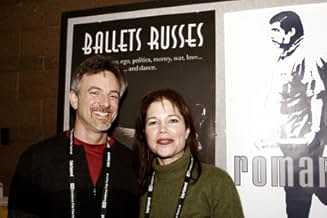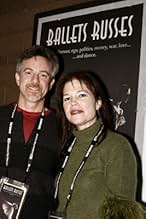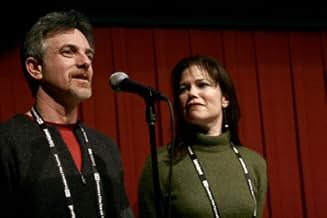Agrega una trama en tu idiomaBallets Russes is an intimate portrait of a group of pioneering artists -- now in their 70s, 80s and 90s -- who gave birth to modern ballet.Ballets Russes is an intimate portrait of a group of pioneering artists -- now in their 70s, 80s and 90s -- who gave birth to modern ballet.Ballets Russes is an intimate portrait of a group of pioneering artists -- now in their 70s, 80s and 90s -- who gave birth to modern ballet.
- Premios
- 2 premios ganados y 2 nominaciones en total
Alicia Markova
- Self
- (as Dame Alicia Markova)
Milada Mladova
- Self (clip "Escape Me Never")
- (material de archivo)
Argumento
¿Sabías que…?
- ConexionesFeatures A Midsummer Night's Dream (1935)
Opinión destacada
I haven't enjoyed a movie this much in years.
One filmmaking challenge I have been puzzling over for years is how to film dance. It is not enough to have a camera placed in a stationary place as if sitting in a theater looking at a stage. When I am at a physical performance, the contract forces me to be stationary, but I have the advantage of the surrounding space and shared breath in darkness, each our own darkness. But the camera can dance, and I find myself wishing to be in the flow. Some filmmakers do well with this immersion (often with choreographed fights). But none reaches the level that I turn fanatical and encourage you to share.
Another troubling film problem for me has to do with film documentaries. I know how to engage with a narrative when the contract is between me, the filmmaker and our collaborators. We can sail. But that contract gets muddled when there is a presumption that the contract and the presented reality are separated. Nominally, we presume film journalism where the filmmaker's craft is to disappear. Alternatively, we can have filmed history where the filmmaker's craft is applied to sharpening focus, interpreting the story rather than telling. Oh, so many documentaries frustrate because you cannot make that contract with the filmmaker that you need to allow the power of the medium to entangle you.
But here is a solution to both of those dilemmas. Superficially the purpose of this is to give us a history of a dance company, the Ballet Russe. It is an important story, how 19 century mastery in ballet was expelled from Russia and found a home in Europe, and thence expelled to the US where it found a home and adapted. This in many ways is an essential story about movement, poise and the value of presence. It affects what we tap when we judge people. It is built into the way we make and see movies.
So it is an important contract, and one the filmmakers honor. But that is not what this film is. The construction is the normal one: the historical journalist as narrator, as much historical footage as possible and as many interviews as time allows with the people who were there, so they can report directly. But what happens is a strange inversion. Instead of the witnesses enriching the story, the story enriches the witnesses and we end up being completely captured by the people who talk to us.
They are in their eighties and nineties, these dancers. All have a vitality that beams into the room where you watch this. All have given countless performances and all of them can count artistic achievement that to me is nearly unfathomable. All of these! While I plow through movies looking for a few that matter, here are some collected lives of people who routinely mattered, working small and large stages across the country as Johnny Appleseeds planting seeds of grace.
It was hard for me to keep all the Russian names straight: we see a modern aged face telling us something from their memories, and then we see that same person fifty, sixty, seventy years before in the situation recalled. I think the filmmakers knew how their project had morphed because they give lots of screen time to these folks, including episodes that have nothing to do with elaborating the history. We simply see them carrying on dancers' lives as best their bodies allow, every one of them alert and insightful.
The DVD has lots of extras, and you will want to gobble them all up, but I wish we could have just seen these old folks walk more. Just walk.
Ted's Evaluation -- 3 of 3: Worth watching.
One filmmaking challenge I have been puzzling over for years is how to film dance. It is not enough to have a camera placed in a stationary place as if sitting in a theater looking at a stage. When I am at a physical performance, the contract forces me to be stationary, but I have the advantage of the surrounding space and shared breath in darkness, each our own darkness. But the camera can dance, and I find myself wishing to be in the flow. Some filmmakers do well with this immersion (often with choreographed fights). But none reaches the level that I turn fanatical and encourage you to share.
Another troubling film problem for me has to do with film documentaries. I know how to engage with a narrative when the contract is between me, the filmmaker and our collaborators. We can sail. But that contract gets muddled when there is a presumption that the contract and the presented reality are separated. Nominally, we presume film journalism where the filmmaker's craft is to disappear. Alternatively, we can have filmed history where the filmmaker's craft is applied to sharpening focus, interpreting the story rather than telling. Oh, so many documentaries frustrate because you cannot make that contract with the filmmaker that you need to allow the power of the medium to entangle you.
But here is a solution to both of those dilemmas. Superficially the purpose of this is to give us a history of a dance company, the Ballet Russe. It is an important story, how 19 century mastery in ballet was expelled from Russia and found a home in Europe, and thence expelled to the US where it found a home and adapted. This in many ways is an essential story about movement, poise and the value of presence. It affects what we tap when we judge people. It is built into the way we make and see movies.
So it is an important contract, and one the filmmakers honor. But that is not what this film is. The construction is the normal one: the historical journalist as narrator, as much historical footage as possible and as many interviews as time allows with the people who were there, so they can report directly. But what happens is a strange inversion. Instead of the witnesses enriching the story, the story enriches the witnesses and we end up being completely captured by the people who talk to us.
They are in their eighties and nineties, these dancers. All have a vitality that beams into the room where you watch this. All have given countless performances and all of them can count artistic achievement that to me is nearly unfathomable. All of these! While I plow through movies looking for a few that matter, here are some collected lives of people who routinely mattered, working small and large stages across the country as Johnny Appleseeds planting seeds of grace.
It was hard for me to keep all the Russian names straight: we see a modern aged face telling us something from their memories, and then we see that same person fifty, sixty, seventy years before in the situation recalled. I think the filmmakers knew how their project had morphed because they give lots of screen time to these folks, including episodes that have nothing to do with elaborating the history. We simply see them carrying on dancers' lives as best their bodies allow, every one of them alert and insightful.
The DVD has lots of extras, and you will want to gobble them all up, but I wish we could have just seen these old folks walk more. Just walk.
Ted's Evaluation -- 3 of 3: Worth watching.
- tedg
- 29 sep 2011
- Enlace permanente
Selecciones populares
Inicia sesión para calificar y agrega a la lista de videos para obtener recomendaciones personalizadas
Detalles
Taquilla
- Total en EE. UU. y Canadá
- USD 815,848
- Fin de semana de estreno en EE. UU. y Canadá
- USD 12,230
- 30 oct 2005
- Total a nivel mundial
- USD 1,331,363
- Tiempo de ejecución1 hora 58 minutos
- Color
- Mezcla de sonido
- Relación de aspecto
- 1.85 : 1
Contribuir a esta página
Sugiere una edición o agrega el contenido que falta

Principales brechas de datos
By what name was Ballets Russes (2005) officially released in Canada in English?
Responda





















